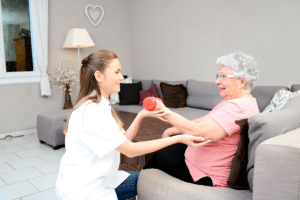
There is nothing wrong with wanting your life to be easier as you age. It doesn’t make you lazy or entitled or anything of the sort. It makes you human. Every tool ever made was in service of making our lives easier. And if you’re a senior, you’re probably all about making life easier.
Goodness knows, you’ve likely had some tough times in your life up until now. And as you may also know that as you age, things can get challenging. Thankfully, there are things that can make life easier for seniors.
As seniors, we deserve to feel comfortable. We’ve lived full lives, worked hard, and as we age, it’s time now more than ever to savor our lives, relax and enjoy ourselves. Here are a few splurges for seniors that are sure to make your life just a little better:
Home Improvements that Make Aging Easier
You would be surprised at how easy it can be to build a patio yourself if you happen to remain handy. If you were considering bringing in a contractor because the job seems too big, you might be right to do so. Before you do, see if upgrading your backyard is something you can do for yourself.
Because this is a “splurge” you may need a secured personal loan to fund the expansion of a patio, ramps, railings, and more to make your home extra comfortable in your later years.
Bear in mind that “easy” is a relative term. Brain surgery is easy for a brain surgeon. By comparison, building your own patio is simple. That said, it is a lot harder than building a model airplane. So use the same strategy you used as a kid and take advantage of a good kit.
For example, patio kits are pretty easy to find because a lot of people are realizing how much they would be overspending to have a contractor do the job. It takes work. But it is definitely doable. At the end of the day, these or other home improvements are worth the effort because they will definitely make your life as a senior more enjoyable.
Subscribe to Meal Kit Services
Here’s a shocker: Meal kits are not just easy; they’re healthy. It doesn’t mean that you can’t find a bad one. But it is harder to do than you think. Meal kits are reshaping how we cook and eat. Like an airplane model, a meal kit has all of the parts you need. They even have instructions that are a lot better than the ones that came with those old models.
Today’s meal kits are typically designed by chefs and dietitians who have an eye on taste and health. By using these kits, many have reported that they are learning things that make them better home cooks when they have time to cook from scratch.
Splurge On Restful Sleep and Relaxation
As we age, sleep can become a tricky prospect. Seniors often complain of body aches, leading to restless nights. Furthermore, the older we get, the less sleep we require. None of these things have to deny us of a deep, restorative sleep. A high-quality, deluxe bed can provide you the slumber you need and deserve.
Consider splurging on a bed that has an electric adjustment built in so you can recline or incline the head or foot of the bed. This allows you to read, knit, watch TV or do whatever your heart desires while comfy and cozy in your new bed. You might also look into getting a mattress that cools and heats. The cooling feature can be extremely soothing, and the heating functions can help ease sore muscles. Whatever type of bed or mattress you choose, you will thank yourself for splurging on this one.
Seniors Deserve to Splurge!
There are any number of splurges that might not offer much benefit in the long run. But among the best are home improvements, meal kits, and superior mattresses.
If you’re a senior, you deserve to enjoy yourself and your time. Part of relishing the good stuff in life as a senior is feeling good. That means self-pampering, and an occasional splurge is definitely in order for your total pleasure and wellbeing. While it’s tempting and often instinctual for seniors to save money – money can’t make life easier if you don’t spend a little. So, why not treat yourself to these splurge ideas so you can savor your senior years in ease and comfort.








